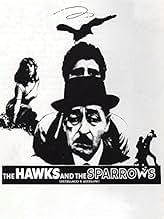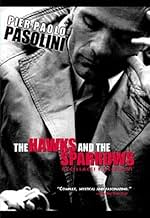CALIFICACIÓN DE IMDb
7.2/10
5.8 k
TU CALIFICACIÓN
Agrega una trama en tu idiomaTotò and his son Ninetto are drifting on a road in Italy when they meet a speaking crow.Totò and his son Ninetto are drifting on a road in Italy when they meet a speaking crow.Totò and his son Ninetto are drifting on a road in Italy when they meet a speaking crow.
- Premios
- 4 premios ganados y 4 nominaciones en total
Totò
- Totò Innocenti
- (as Toto')
- …
Ninetto Davoli
- Ninetto Innocenti
- (as Davoli Ninetto)
- …
Nello Appodia
- Party Guest
- (sin créditos)
Gabriele Baldini
- Dante's Dentist
- (sin créditos)
Pietro Davoli
- Mascalzone
- (sin créditos)
Rossana Di Rocco
- Ninetto's Girlfriend
- (sin créditos)
Argumento
¿Sabías que…?
- TriviaFilm's opening credits are not only displayed on screen but also comically sung in Italian to a jaunty Ennio Morricone score, with a memorably droll rhyming of the film title with the director's full name.
- Créditos curiososThe opening credits are performed as a song.
- ConexionesEdited into Histoire(s) du cinéma: Une histoire seule (1989)
- Bandas sonorasUccellacci E Uccellini (Titoli Di Testa)
Composed by Ennio Morricone and Pier Paolo Pasolini
Performed by Domenico Modugno
Opinión destacada
How I love a film that taps into the absurd while staying true to the symbolism, and in the process mocking it and then creating symbolism again. It's a very tricky thing- Bunuel was one of the masters at it- and Pier Paolo Pasolini, in one of his rare outright comedies, does just that. The Hawks and the Sparrows is simple enough to explain, in its central conceit: an older man (Toto) and a younger man (Ninetto) are walking along on some not-totally-clear journey (Toto might have some debts to fix or something, and he has apparently eighteen children), and they meet a talking crow, who talks and talks a lot. Then they get into some strange happenings, all comical. But it's the kind of comedy then that Pasolini uses like some deranged poetic waxing on about silent comedy and theories on God and faith and love and politics and, uh, stomach cramps I guess. It's completely off the wall, at times like a roadrunner cartoon (or, for that matter, the best Buster Keaton), and it's told with a dedication to the comic situation. It's masterful.
At times it doesn't seem that way though. It could, in less concerted hands, be more scatter-shot, with some scenes working better than others, and with the one sure bet being the crow (voiced by a great Francesco Leonetti). But from the start, Paoslini is completely confident with the material, from the opening titles that are sung (heh), with the throw-away scene with the kids dancing at the restaurant (with an amazing Ennio Morricone rock song that pops in and out of the film), to the sudden inter-titles ala Monty Python ("the crow is a "left-wing intellectual"), and then onward with the little stories within the framework of the 'road movie'. The biggest chunk Pasolini shows us is the story of two monks- also played by Toto and Davoli- who are instructed by their head monk to talk to the hawks and sparrows and teach them about God. And they do, in bird speak (which is also subtitled in case it's needed), and then go through an allegorical tale of the ins and outs of faith.
It takes some wicked subversion to make these scenes work, but they work hilariously, to the point where I laughed almost every minute of the sequence (as well as with other ones, the exception being the archival clips late in the film of the protest marches). Pasolini once said he was "as unbeliever who has a nostalgia for belief", imbues the story of the monks with a sense of charm to it- you like Toto and Davoli in the parts, not even so much that they're good in the roles, which they are very much so, but because there's some bedrock that the satire can spring from so easily. He, via the exceptional Tonino Delli Colli, films the Hawks and the Sparrows as strong in sumptuous black and white as any of his other early-mid 60s films. But there's a lot more going on within the comedy; it's like he skims a line that he could make it as, like with some of his other work (unfortunately ala Teorema) pretentious and annoyingly trite in its intellectual points. But as he goes to lengths to put a spin on it, it turns into pitch-black comedy, revealing him as an even deeper artist because of it.
Take the birth scene, where the weird theater-type troupe who drive around in a car have to pause in their play on "How the Romans Ruined the Earth", and it suddenly becomes a sly farce unto itself. Something that should be sacred is given the air of playfulness, as though everyone is told "yes, it's alright to be in on the joke", where Toto covers Ninetto's eyes, other actors in the group pray, and then walla, there's a baby, clean as day. Morricone's score, I might add, brings a lot to this air of fun and playfulness, even when (and rightfully so) it goes to the more typical strings and orchestral sounds than the rockabilly, which sounds more like unused bits from Pulp Fiction. And finally, there's the crow itself, which unto itself- had Pasolini not made it mockable- would be funny anyway, as it's a frigging talking crow who for some reason follows the men anywhere they go. It's already allegorical of a sort of guide or voice of reason on their journey, which is fine. But including the ending especially, Pasolini allows for the joke to flip over itself.
With the Hawks and the Sparrows, we get the absurd and the surreal, placed wonderfully in social constructs, and it reveals a filmmaker who can, unlike but like his controversial reputation presents, open up a whole other perspective with a strange twist that mixes classic Italian film style and scathing subject matter. A+
At times it doesn't seem that way though. It could, in less concerted hands, be more scatter-shot, with some scenes working better than others, and with the one sure bet being the crow (voiced by a great Francesco Leonetti). But from the start, Paoslini is completely confident with the material, from the opening titles that are sung (heh), with the throw-away scene with the kids dancing at the restaurant (with an amazing Ennio Morricone rock song that pops in and out of the film), to the sudden inter-titles ala Monty Python ("the crow is a "left-wing intellectual"), and then onward with the little stories within the framework of the 'road movie'. The biggest chunk Pasolini shows us is the story of two monks- also played by Toto and Davoli- who are instructed by their head monk to talk to the hawks and sparrows and teach them about God. And they do, in bird speak (which is also subtitled in case it's needed), and then go through an allegorical tale of the ins and outs of faith.
It takes some wicked subversion to make these scenes work, but they work hilariously, to the point where I laughed almost every minute of the sequence (as well as with other ones, the exception being the archival clips late in the film of the protest marches). Pasolini once said he was "as unbeliever who has a nostalgia for belief", imbues the story of the monks with a sense of charm to it- you like Toto and Davoli in the parts, not even so much that they're good in the roles, which they are very much so, but because there's some bedrock that the satire can spring from so easily. He, via the exceptional Tonino Delli Colli, films the Hawks and the Sparrows as strong in sumptuous black and white as any of his other early-mid 60s films. But there's a lot more going on within the comedy; it's like he skims a line that he could make it as, like with some of his other work (unfortunately ala Teorema) pretentious and annoyingly trite in its intellectual points. But as he goes to lengths to put a spin on it, it turns into pitch-black comedy, revealing him as an even deeper artist because of it.
Take the birth scene, where the weird theater-type troupe who drive around in a car have to pause in their play on "How the Romans Ruined the Earth", and it suddenly becomes a sly farce unto itself. Something that should be sacred is given the air of playfulness, as though everyone is told "yes, it's alright to be in on the joke", where Toto covers Ninetto's eyes, other actors in the group pray, and then walla, there's a baby, clean as day. Morricone's score, I might add, brings a lot to this air of fun and playfulness, even when (and rightfully so) it goes to the more typical strings and orchestral sounds than the rockabilly, which sounds more like unused bits from Pulp Fiction. And finally, there's the crow itself, which unto itself- had Pasolini not made it mockable- would be funny anyway, as it's a frigging talking crow who for some reason follows the men anywhere they go. It's already allegorical of a sort of guide or voice of reason on their journey, which is fine. But including the ending especially, Pasolini allows for the joke to flip over itself.
With the Hawks and the Sparrows, we get the absurd and the surreal, placed wonderfully in social constructs, and it reveals a filmmaker who can, unlike but like his controversial reputation presents, open up a whole other perspective with a strange twist that mixes classic Italian film style and scathing subject matter. A+
- Quinoa1984
- 17 ene 2008
- Enlace permanente
Selecciones populares
Inicia sesión para calificar y agrega a la lista de videos para obtener recomendaciones personalizadas
- How long is The Hawks and the Sparrows?Con tecnología de Alexa
Detalles
Taquilla
- Total a nivel mundial
- USD 3,348
- Tiempo de ejecución1 hora 29 minutos
- Color
- Mezcla de sonido
- Relación de aspecto
- 1.85 : 1
Contribuir a esta página
Sugiere una edición o agrega el contenido que falta

Principales brechas de datos
By what name was Uccellacci e uccellini (1966) officially released in India in English?
Responda


















